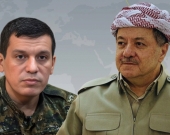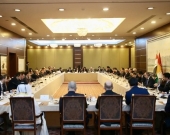Hagel: Military power backs Gulf security

While touring an anti-mine warship in the U.S. Fifth Fleet, Hagel reiterated America’s support for the Gulf.
Hagel said the U.S. military is committed to maintaining its 35,000-strong force in the Gulf region regardless of a nuclear deal with Iran.
The United States has "more than 35,000 military personnel" in and around the Gulf and "will not make any adjustments to its forces in the region" as a result of the interim accord with Iran, said Hagel, according to a prepared text of a speech.
The ship he toured, the USS Ponce, is to be equipped in 2014 with a new laser weapon designed to deter aircraft and missiles as well as attacks by swarms of small boats like those used by Iran, on the opposite side of the Gulf.
“Our history in this area is long and proud. Our commitment to our partners in this area speaks for itself and I will assure our partners that we’re not going anywhere,” he said.
“This region is dangerous, it’s combustible, it’s unstable,” Hagel continued. “But having a steady American hand in this region can help our allies and reassure our allies.”
“We are not going to change any of our military posture in this area or any part of the world during that six- month period,” Hagel said speaking specifically to the worry that the latest deal grants Iran a six month interim period to diminish its uranium and nuclear facilities.
“We will keep the same kind of strong assets, the same exercises, the same partnerships, and the same focus on our strategic interests that we had before.”
Hagel also said Saturday that diplomacy with Iran must be backed up by military power.
“We know diplomacy cannot operate in a vacuum,” the Pentagon chief said, speaking in Bahrain, just across the Gulf from Iran.
“Our success will continue to hinge on America's military power, and the credibility of our assurances to our allies and partners in the Middle East.”
Jon Alterman, director of the Middle East program at the Center for Strategic and International Studies think tank in Washington, told Reuters that Gulf Arab leaders felt U.S. policy was misguided and that when they wanted to air their concerns, there was no one in the Obama administration to talk to.
“There’s been a deep sense that nobody’s listening to them,” Alterman said. Personal relationships in policymaking are critical in the Gulf, he said, and many regional leaders do not believe they have that kind of connection with Obama.
Alterman said Hagel’s task would be to listen to the leaders’ concerns, to clearly explain U.S. security moves and to “emphasize the fact that strategically we have very, very closely-aligned interests.”
Hagel planned to explain U.S. security thinking in a speech on Saturday to the Manama Dialogue, which is broadly attended by defense figures in the Middle East.
Coinciding with the visit was the U.S. Congress’ approval of a sale of more than 15,000 Raytheon Co anti-tank missiles to Saudi Arabia. The sale will total $1.1 billion.
“The proposed sale will contribute to the foreign policy and national security of the United States by helping to improve the security of a critical partner who has been, and continues to be, an important force for political stability in the Middle East,” the Defense Security Cooperation Agency (DSCA) said on its website.
The United States has sold more than $81 billion worth of arms to Gulf countries since 2007, $10 billion of which was announced by Hagel earlier this year on his first trip to the region as defense secretary , reported the New York Times.
The Gulf had expressed their concerns following the West’s Nov. 23 talks with Iran on reducing its nuclear capabilities. The deal freezes or reverses the progress of all of Iran’s major nuclear facilities, ceases the installation of new centrifuges used to enrich uranium and limits the quantity of enriched uranium Iran is allowed to produce.
But the Gulf States fear the deal could potentially fortify Iran’s power on the international stage. The majority Sunni Gulf states have long been wary of Shi’ite-led Iran pursuing a nuclear program.
Al Arabiya (With Reuters)












